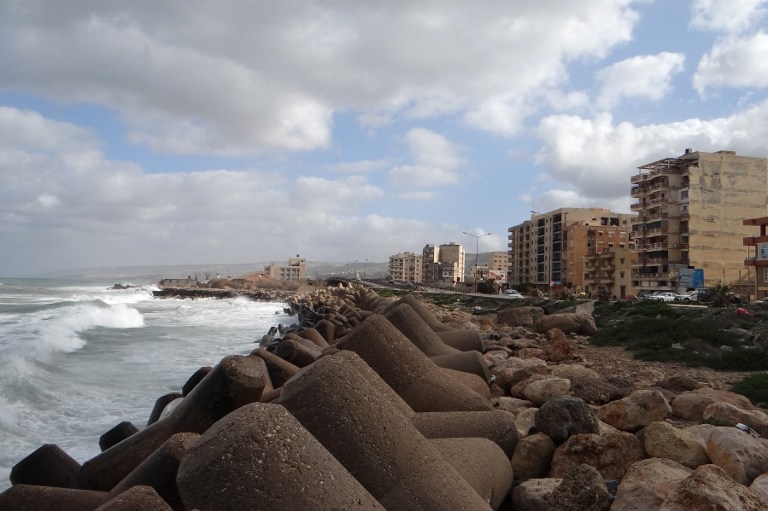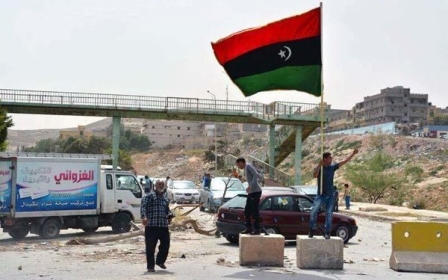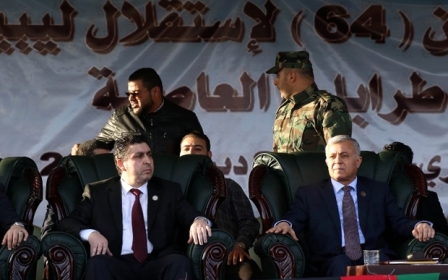Celebrations in Libya's Derna after army pushes IS into the desert

Islamic State militants were headed through the Libyan desert on Thursday, towards their North African stronghold of Sirte, a day after Libyan armed forces pushed the militant group out of Derna, according to the military.
“IS escaped into an area south of Derna, following the instructions of their leader [Abu Bakr] Al-Baghdadi, and from there they fled into the desert,” the spokesman for Derna’s Omar Mukhtar Security Operations Room, Abdelkarim Sabra, told Middle East Eye.
Sabra said the militants had escaped in an estimated 32 vehicles towards Sirte, situated on the central Libyan coast.
While fleeing, the militants detonated a bomb at a patrol station in the Al-Maheili area, which is known as a hotspot for the smuggling of weapons, drugs and people, Sabra said.
Although Al-Maheili is strategically located, with access to routes leading to Ajdabiya, Sirte and even Egypt, its remote desert location has prevented the Libyan Army from maintaining any meaningful control over the area.
“We are expecting they will go to Sirte, but it would be impossible for them to move through the desert in convoy because of aerial surveillance and because there are many checkpoints to pass if they use the road,” said Mohamed, a former senior official from Sirte, now living in Tripoli.
Based on previous observations of how IS operated in the area, Mohamed said it was likely they would scatter into the desert and proceed either on foot or in civilian vehicles.“They will have to split up and then they have only two options - either to try to get through checkpoints on the main road, disguised in normal cars, or go via the oil fields in the desert and approach Sirte from the south,” Mohamed explained.
“A brigade from Adjabiya has sent 200 cars to patrol the desert, to try and intercept these IS people and prevent them reaching Sirte or other IS-controlled towns, such as Nufaliya and Bin Jawad.”
IS has controlled Sirte for over a year, brutally crushing any dissent, including an uprising against them in the town last year. Apart from a handful of clashes with forces from Libya’s third city of Misrata, IS has largely been allowed to expand unchecked across Sirte and the surrounding area. Mohammed estimated that there were now as many as 5,000 fighters in the town.
Bombs left behind
Sabra, speaking from Derna, said the operations room - part of the Libyan Army operating under the command of General Khalifa Haftar and Libya’s eastern-based parliament the House of Representatives - had now taken full control of the two Derna suburbs where IS had been based.
However seven bomb disposal personnel were killed late on Wednesday when one device blew up before it could be deactivated.
The Fatehah district and an adjacent suburb called District 400, both located on the higher reaches of the coastal town were strategically crucial. Affording a view over the town itself and with direct access to the Al-Maheili area to the south, from there IS militants had been able to both monitor the town and come and go freely.
The Libyan Army’s Brigade 102 is now securing both districts, clearing unexploded ordnance, mines and IEDs laid by retreating militants, Sabra said.
Once the areas are secured, local residents who have been displaced for over a year are expected to be allowed to start returning to their homes, and electricians and engineers can start repairing infrastructure damaged by months of sporadic fighting and air strikes.
On Wednesday night, jubilant celebrations were held in the town centre and the Libyan tricolour flag, banned for almost two years, was once again seen flying in the streets.
Battles to come?
Sabra insisted that the eviction of IS from Derna had been the sole work of the Libyan Army, but the Libya Observer news outlet reported that the Derna Mujahideen Shura Council (DMSC) - an al-Qaeda affiliated group - had been responsible for driving militants from the city.
Although the Libyan Army fought against the DMSC previously, there was some limited cooperation between the two last year when the DMSC clashed with IS after militants killed a prominent DMSC leader.
One Benghazi resident who regularly visits Derna for work, 33-year-old Omar, expressed doubts about the DMSC’s current stance.
“It is a surprise to see people from the DMSC now waving the Libyan flag. When Derna was controlled by both IS and the DMSC, it was impossible to see the Libyan flag anywhere in the town. I saw only the black flags of al-Qaeda and IS, and they were flying everywhere,” he said.
“These extremists caused problems before IS, sabotaging elections in 2014. They were responsible for bringing IS to Derna and then they worked together to control the town until IS killed one of their leaders last year.”
Following strong clashes in late 2014, the DMSC reduced IS’s territorial control to the suburbs of Derna, which had been a no-go area for civilians since the Libyan Army started carrying out air strikes in the district earlier that year.
“The DMSC still don’t believe in freedom or democracy and they are supported by some people in Derna, because the town has a history of extremist thinking,” Omar said.
“The town was always like this, even under [Muammar] Qaddafi, who made several strong military crackdowns on Derna because he knew the dangers of allowing such extremist thinkers to spread their ideologies in Libya,” he said, referring to the former Libyan leader.
He said that, although he had been against Qaddafi and had supported the revolution, it had become clear that the former leader had maintained effective policies in combating terrorism in the country.
“Since 2011, many terrorists who were in jail under Qaddafi have now become politicians,” Omar said. “It’s crazy. Many of them fought in Afghanistan with al-Qaeda and these people are like snakes, they just change their skin depending on the weather.”
He predicted future battles between the DMSC and the Libyan Army. “For the moment the DMSC is waving the Libyan flag, but they are basically still al-Qaeda,” he said. “The Libyan Army will have to take complete control over Derna eventually and there will be another battle but, for now, local people are very happy just to be free of IS.”
Middle East Eye propose une couverture et une analyse indépendantes et incomparables du Moyen-Orient, de l’Afrique du Nord et d’autres régions du monde. Pour en savoir plus sur la reprise de ce contenu et les frais qui s’appliquent, veuillez remplir ce formulaire [en anglais]. Pour en savoir plus sur MEE, cliquez ici [en anglais].





